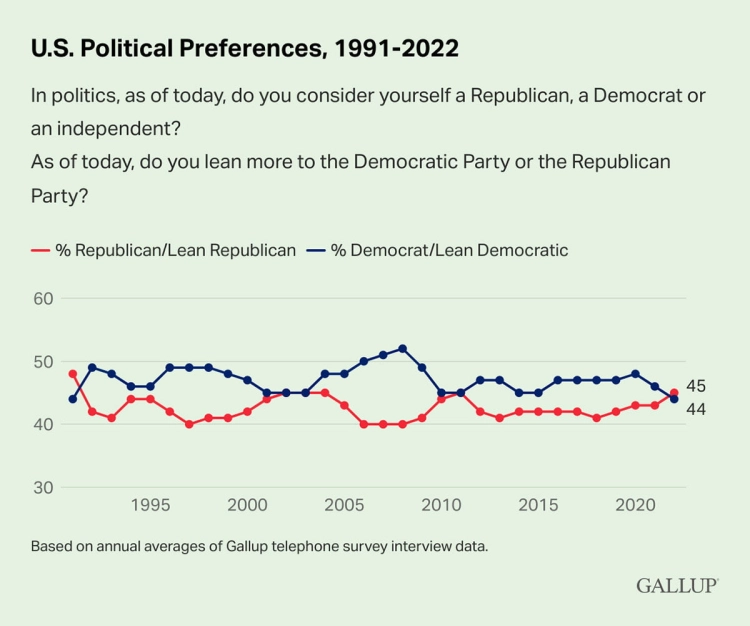

History is full of repeating cycles, and if there's one question I often ask myself, it’s, “Is history repeating itself?” Take a moment to think about it—politics, for instance. Success in elections often hinges on popularity and media attention. Politicians may be tempted to prioritize public image over substantial policy ideas, and we've seen this more recently in the political playbooks of more politicians. Inspired by former President Trump, some focus on shock value, repeating populist slogans to grab attention. This move has pushed more moderate voices to the sidelines, making it harder to find middle ground.
Yet, what does this focus on media attention really accomplish? For the first time in over three decades, more people are identifying as Republican than Democrat. It makes you wonder—what’s actually happening here?
One hundred years ago, we were in a similar situation. The political landscape was shifting rightward, with conservatives in power passing laws in response to what they saw as the cultural excesses of the previous decade. If this sounds familiar, it's because we’ve been down this road before.

Let’s start with Prohibition. In 1920, the 18th Amendment made it illegal to produce, sell, or transport alcohol in the U.S. The idea was simple: curb what was seen as a social vice and restore moral order. But as with many overly restrictive policies, the consequences were far from what was intended. Prohibition fueled organized crime, and bootleggers flourished. Instead of eliminating alcohol from society, it drove the industry underground, giving rise to a new wave of criminal enterprises. The ban lasted until 1933, but its impact is still part of American lore.
Around the same time, in 1924, the Immigration Act came into effect, sharply restricting immigration, especially from non-Western European countries. It even placed a complete ban on immigrants from Asia, motivated by fears over racial purity and competition for jobs. This fear-based reaction to social change wasn’t limited to immigration alone. A few years earlier, in 1918, the Sedition Act made it illegal to criticize the government, the flag, or the military during wartime. Though the law was repealed in 1921, the sentiment lived on, influencing later laws aimed at limiting free speech.
Then, of course, there was the Red Scare. After the Russian Revolution, fear of communism swept through the U.S. Thousands were arrested or blacklisted for their political beliefs in the name of preserving American values. These were times of repression, marked by an anxiety over losing the 'American way of life.'
It wasn’t just social issues that repeated. Economically, high tariffs on imports were intended to protect American industries. But as other countries retaliated, global demand for American goods plummeted. This protectionism contributed to the economic collapse that led to the Great Depression, which devastated millions of lives. Americans wanted nothing to do with the global stage after the horrors of World War I, but this isolationist stance left room for authoritarian regimes to gain power abroad. The rest, as they say, is history.

If there's one thing history has taught us, it's that power abhors a vacuum. If the U.S. pulls back from the global stage, there are others waiting to step in. And they may not share our values. Imagine a world where the U.S. says, “We’re done with international involvement; leave us alone.” It sounds like a fantasy, but the consequences are all too real.
Russia would waste no time in asserting dominance. Ukraine would fall, and Russia would move on to other Baltic states. Europe, without U.S. support, would likely form its own military bloc, leaving America isolated and weakened. Key allies like Australia and Canada could shift their alliances, further diminishing U.S. influence.
Then there’s China. Already a rising power, China would seize the opportunity to accelerate its influence in Asia, quickly taking control of Taiwan and expanding its grip on the region. Its growing influence in Africa would give it the resources to become the dominant global power. With Chinese currency becoming the global reserve, the U.S. economy could face a devastating blow.
In the Middle East, U.S. withdrawal would create a dangerous power vacuum. Long-standing tensions between Saudi Arabia and Iran could ignite into full-scale war, and Israel, without American backing, would be left vulnerable. Regional conflicts would likely escalate, with potentially catastrophic consequences.
South Asia wouldn’t fare much better. Without U.S. support, India would be left to fend off both China and Pakistan, potentially destabilizing one of the most critical regions in the world.
What about technology and innovation? The U.S. has long been a leader in these fields, but stepping back would give others the chance to take over. China, already a significant player in emerging technologies like AI and quantum computing, would set the global standards. American companies, reliant on global markets, would struggle under less favorable trade policies.
On the environmental front, the absence of U.S. leadership could mean more lax efforts to combat climate change. Without the pressure from one of the world’s largest economies, countries like China and India could further delay meaningful action on emissions, contributing to an already worsening climate crisis.
So, where does this leave us? If America steps back from global leadership, we open the door for other powers to fill the void. But it’s not just about maintaining dominance—it’s about ensuring that the world we leave for future generations is one shaped by cooperation, innovation, and balance.
We’re all on the same ship, and rocking the boat with divisive politics could lead to disaster. History does tend to repeat itself, but we have the ability to learn from it and shape a better future. Our past mistakes—whether it’s economic isolation, repressive laws, or global indifference—don’t have to be our future.
It’s time to recognize the interconnectedness of today’s world and understand that America’s role in it matters. By reinforcing our common bonds and staying engaged on the global stage, we can work toward a more stable and prosperous future for all.
Because in the end, history may repeat itself—but we don’t have to let it.